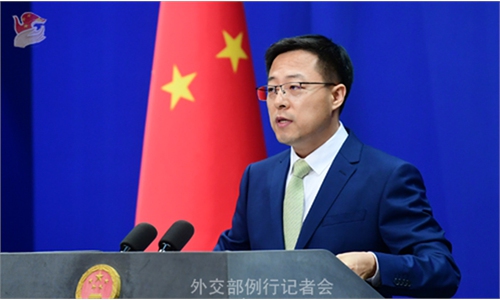
China's chip company Nanchang O-Film Tech (O-Film) Photo:VCG
The US government's decision to exclude China's chip company Nanchang O-Film Tech (O-Film) from its so-called entity list is a welcome move that serves as a reminder for Washington that any irresponsible sanctions aiming to disrupt Chinese supply chains will invariably backfire, experts said.
The End-User Review Committee of the US government announced on Tuesday a decision to remove O-Film from the entity list, a decision that was welcomed by the company in a written statement on Wednesday, ending a two-year sanctioning over the alleged "forced-labor" claim.
Driven by the news, the company's stock price reached its daily ceiling of 10 percent on Wednesday's opening at China's A-share market and closed at 6.8 yuan ($1.015) per share.
"It was quite abrupt when the US added us on the entity list in 2020," a person from the company said when reached by the Global Times on Wednesday, adding that the exclusion from the list is a good news for the company.
"The company had been working to have itself removed from the list," the person said.
In July 2020, the US Commerce Department added the Nanchang-based maker of camera modules, together with 10 other Chinese entities under the "forced labor" claim in Northwest China's Xinjiang Uygur Autonomous Region, an allegation that the companies strongly denied.
According to relevant regulations, the US government could restrict the export, import or re-export to these companies in accordance with the Export Administration Regulations, which in turn brings uncertainty as to whether O-Film can continue as a supplier to Apple.
In a previous statement that O-Film made in responding to the US move in July 2020 that "as a global leader in tech innovation and advanced high-tech manufacturing, the company has always abided by the laws and regulations of the nations where they operate."
O-Film used to be a stable component supplier for Apple before it was removed from the list of suppliers last March, which industry insiders believed was a possible outcome of the US entity list.
The lingering difficulties for some US technology companies such as Apple over global supply chain disruptions and inadequate production capacity might push the US government to reconsider the ban, Ma Jihua, a veteran technology analyst, told the Global Times on Wednesday.
Ma said that the removal from the list could be an important turning point not just for O-Film but a possible indication that more companies could be excluded from the list, as the US government sees an unavoidable fact that the arbitrary crackdown on Chinese companies and the supply chain will face a strong backlash that will hurt US companies and key industries.
Noticeably, the company being removed from the entity list is another clear example of how the "forced labor" allegation that has been repeatedly hyped by the US and some Western countries has failed, experts said.
"The entity list is something that reflects the US long-arm jurisdiction and unilateralism while the removal shows that the so-called forced labor allegation is a lie made up by them," Dong Shaopeng, a senior research fellow at the Chongyang Institute for Financial Studies at Renmin University of China, told the Global Times on Wednesday.


